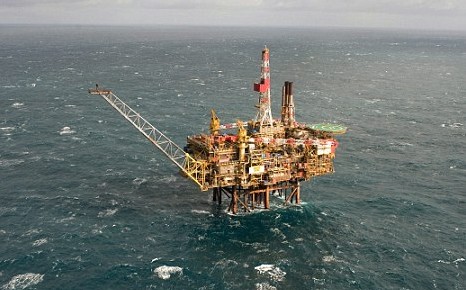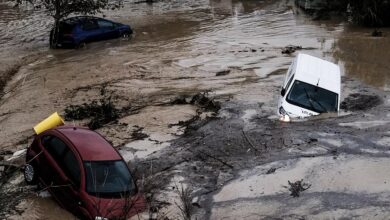
The Anglo-Dutch oil company giant Shell informed it detected another oil spill in an inaccessible seabed area of the Gannet Alpha platform in the North Sea, 180 kilometers away from Aberdeen, Scotland.
Shell confirmed this week that more 54,600 gallons 1,300 barrels have so far gushed from an initial pipe leak connected to its platform in the North Sea and at least five barrels daily continue to spill into the ocean.
For Shell, the timing of a spill at its Gannet A facility in the UK North Sea couldn’t have been worse. For months, it has been selling its reputation as a responsible and cutting-edge oil company in its bid to drill in the Beaufort Sea in the US Arctic – and it recently won approval.
Oil spill in North Sea exposes Shell’s ticking timebomb
Technical director of Shell’s exploration and production activities, Glen Cayley declared the control of the second leak would be very complicated because of its hard-to-reach location, surrounded by aquatic plants. He added the company regrets this accident, the worst in the United Kingdom in 10 years. The Dutch firm said it had no evidence of any harm to birdlife
However environmental groups such Greenpeace were concerned about the danger the spill represents for marine flora and fauna in the area in the North Sea. Campaigners WWF Scotland said the accident raised serious concerns about Shell’s plans to drill in the Arctic.
Shell Gannet Platform : Reminder of ageing rigs and bad PR
The Gannet Alpha spill in the North Sea is a stark reminder of the dangers of ageing rigs and oil company PR. The Gannet Alpha platform spill and a damning report by the UN, undermining Shell’s PR strategy
Shell’s oil spill in the UK North Sea comes barely a week after the United Nations Organisation issued a strong condemnation of the company’s environmental effect in the Ogoni region of the Niger Delta. In a string of claims, the UN environment programme accused Shell of failing to meet its own environmental standards, colluding with government officials to cover up oil spill sites and 40 years of devastating pollution. An estimated nine to 13 million barrels of oil have been spilled in the Delta – equivalent to one Exxon Valdez oil disaster every year, for 50 years.
The company has been castigated over its lack of transparency in reporting the leak and for downplaying its magnitude and potential impacts. We now know that the spill is the single largest in UK waters in the last 10 years. While the spill is unlikely to approach the devastating impacts of the Deepwater Horizon disaster, its significance lies in the fact that it took place under the much vaunted “gold standard” regulatory regime of the UK and by a company that has been trading on its reputation as a responsible corporate citizen.
Shell Gannet Platform : A wake up call to British Government
Gannet Alpha platform should serve as a wake-up call to a government that has for too long relied on industry assurances that the regime in the UK is “fit for purpose” and “robust”. Gannet Alpha platform and its satellite projects are among the majority of offshore installations that are approaching or have exceeded their original design life (typically 20 to 25 years) and are posing an extra threat the longer they continue to operate. Most of these rigs lie rusting in the southern North Sea region close to the Scottish coastline as they are pushed to extract every last drop of black gold. According to the Health and Safety Executive, the majority of hydrocarbon releases happen at platform facilities older than 20 years old, and more than 50% of existing platforms fall under that category. Gannet Alpha will be entering its 20th age next year.
More stringent regulation is urgently required, and there is widespread support for a proposal by the EU commission to extend binding EU environmental and safety regulations to cover European oil companies operating overseas. The difference between the Gulf of Guinea and the UK Continental Shelf is a matter of degree.
[adrotate group=”16″]

